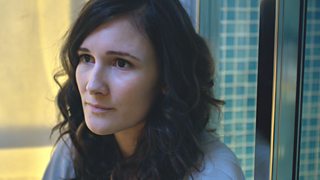Sarah Solemani: "It’s a great feeling to be saying your own words because it means you’re really creating a whole world"
Sarah Solemani wrote and stars in 'The Conversation'. She plays 'Charlotte' who discovers the night before her wedding, that her fiancé was once accused of a shocking crime. The bride-to-be faces an important dilemma as the clock ticks down towards her big day. Here, she discusses the storyline and the experience of acting her own script.

The script is a guide, it’s not a bibleSarah Solemani
What attracted you to working on the project?
I’ve always been a huge fan of 'Working Title' - and of the films and TV shows that they make - so to be asked by them to write for the series was a real honour. I’ve always thought Dominic Savage’s work was brilliant too – he’s on top of his game. Both of these combined with it being for ����ý One was music to my ears.
How was it working with Dominic?
It was a real masterclass in screenwriting because he’s very fluid in how he works. The script is a guide, it’s not a bible. It’s a starting point and everyone is welcome to take what they think the story needs and work from that. It’s very collaborative and open. It feels very alive.
Each episode is given a starting point – how did you decide where to take the storyline?
I read an article about someone whose friend had told them they’d been accused of a shocking crime and not been convicted. And even though they were innocent, just the suggestion, the accusation, changed the nature of the relationship because it opened up the person’s doubts about them. So I thought that might be interesting territory for a drama, especially if connected to a bride and groom. You might have doubts about someone that you push away but if they’re brought to the fore and confronted, how do you cope?
How does Charlotte feel when she finds out about Tom’s secret?
What’s interesting is that she’s initially quite dismissive and unaffected. Slowly, as the piece progresses, the niggling doubt becomes more and more acute to the point where you’re not sure if she’ll go through with it.
As it's set against the backdrop of their wedding, could it not just be pre-wedding jitters?
It’s such an enormous occasion - so much pressure and expectation - how far are we allowed to indulge those jitters? That’s what you’re watching – how much is jitters and how much is absolute dread?
How do you find acting your own script – do you resist the temptation to change it once you’re on set?
Yes, you could constantly be editing but that is what’s so good about Dominic’s technique of using improvisation as you can self-edit as you’re acting. But it’s a great feeling to be saying your own words because it means you’re really creating a whole world.
Why do you think it’s important that new writers are given this opportunity?
I think it’s important to have fresh blood going through an institution. Older writers, even if they’re experienced, can maybe fall into the same tricks or not take the same kind of risks but when you’re an emerging writer, you’ve got nothing to lose. So you might take more risks and be bolder and go to places that other people don’t. I always love new writing on television and on stage. It’s important, it’s new voices and we need to know what people are thinking and feeling out there.
What do you hope the audience will take away from watching The Conversation?
I hope that they’ll be gripped, and I hope that it divides opinion on the guilt of the man and the choice of the bride. Even in just writing it, the responses were so different and men felt differently to women. I’d like it start a conversation about the themes that it covers as they’re quite important.
